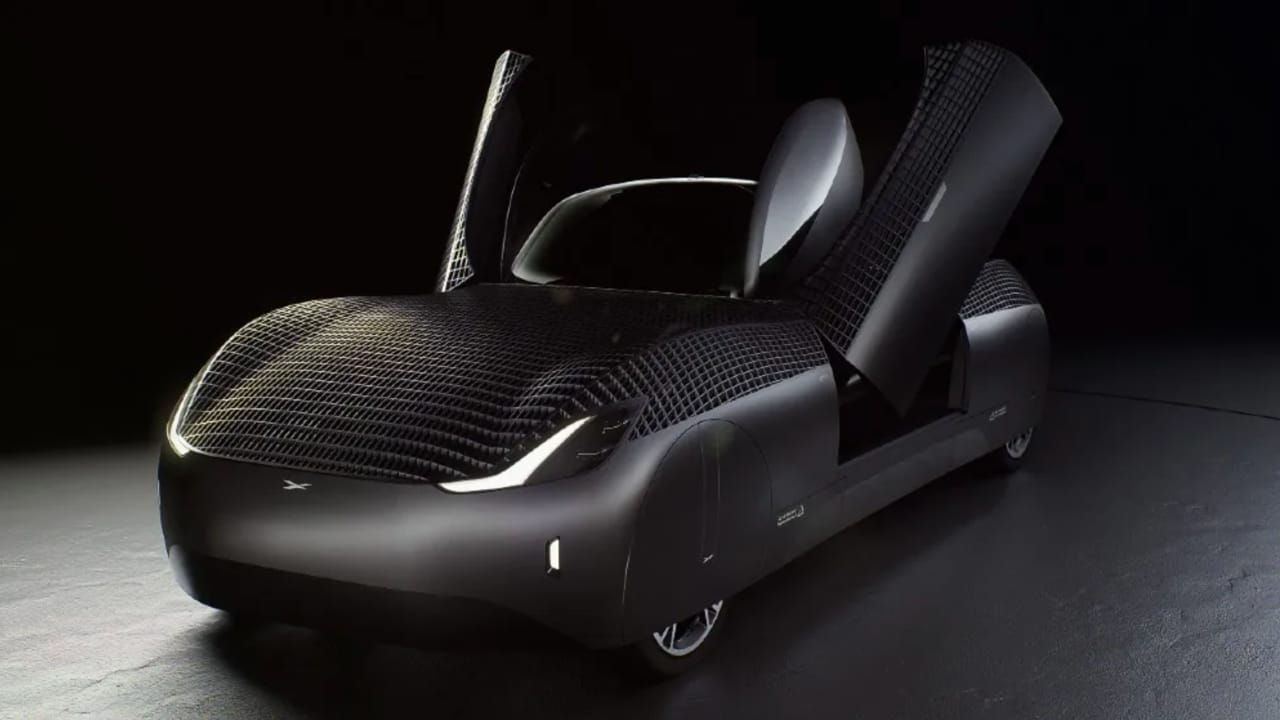A flying car sketched on a Silicon Valley coffee shop napkin in 2015 made its public debut eight years later at the Detroit Auto Show, which concludes today.
Alef Aeronautics, a California-based start-up, unveiled its Model A prototype, to unusually large crowds that circled the curvy, UFO-like contraption, punctuated with a bubble-like compartment for two passengers. Alef is one of a half-dozen manufacturers in the U.S., Europe, and Asia planning to introduce flying cars in the next few years that are street-legal. The list also includes the Pal V Liberty, Samson Switchblade, Aska A5, Klein Vision AirCar, and Doroni H1.

Though the concept in Detroit showcased the Model A’s exterior design, it did not drive, fly, or open to show the passenger cabin. “It’s still not the final consumer version,” Alef founder and CEO Jim Dukhovny told Robb Report during an interview after the press event. “But at this point, it’s pretty close.”
The Model A’s blue underbody encases its four tires, each with an individual motor for the flying-car’s drive mode. A silver, lightweight carbon-fiber mesh overlays its eight propellers, each with an independent, software-controlled electric propulsion system to spin at different speeds for redundancy and control.
“You need airflow so obviously we cannot have a solid top, but we can’t have it completely open for safety reasons,” says Dukhovny, whose father was famous musician and poet Leonid Dukhovny.
The conveyance measures about 17 feet long, seven feet wide and six feet high – similar to the dimensions of an SUV—designed to fit in any parking space or garage.
Dukhovny says the tri-modal machine—which can drive, take off vertically, and fly forward—can travel 200 miles on the road and 110 miles in flight.
Aimed at the general public, Dukhovny says it’s easy to learn. “I can teach you how to fly and drive this in about 15 minutes or less,” he says. “If you can tell the difference between the right, left, up, down, front and back, you can do this. It’s pretty much the only controls it has.”
Legally, the rules for operating the flying car are less clear. “There’s many things we’re going to work with the legal authorities on,” he says. NASA is currently at work on a long-term solution for a “highway in the sky” that can accommodate flying cars, eVTOL taxis, and drone delivery services.
The $300,000 price tag means it’s for early adopters, especially ones who live in Silicon Valley, where the Model A can legally fly in certain areas, and who may have country homes in places like Jackson Hole, Wyo., which have fewer restrictions on flight mode. The Model A is hand-built at Alef’s California warehouse, but Dukhovny’s goal is mass production that could put the price on par with a compact car.
“It’s handmade because it’s custom and low volume, but fundamentally there is nothing in here which would make it more expensive than a Toyota Corolla,” he says. Still, Dukhovny is wary of naming a launch date. “If everything goes right, we plan to start the first production of the first car by the end of 2025.”

Dukhovny and cofounders Constantine Kisly, Pavel Markin, and Oleg Petrov first outlined the design for the Model A in 2015, the same year that Marty McFly visits in the 1989 film Back to the Future, he notes. “But there was one huge problem,” he says. “There was no energy density in the world which can support flying this for more than 10 or 15 minutes.”
Silicon Valley venture capitalist Tim Draper, an early investor in Tesla and other successful startups, forced Alef to come up with a solution, Dukhovny says. The answer Alef developed was to use the sides of the car as the wings, effectively turning it into a biplane, its body rotating 90 degrees after takeoff to move from upward to forward flight.
Now with 18 investors, the company currently holds two patents for its flight technology. It’s also designing thinner, lighter tires; developing a hydrogen option that would double the range; and considering designing a pressurized cabin so that the Model A can reach greater heights than the few hundred feet it’s designed to fly.
Dukhovny originally imagined that the flying car could help save time wasted in traffic during commutes, but “every time I talk to somebody, people come up with new use cases.”

Those include search-and-rescue efforts, and emergency exits for people living in island communities, and recently, someone told him it would be the perfect vehicle for collecting your child at school. “You can just land vertically, pick up your kid and fly,” he says. “That’s one case scenario that I hadn’t thought about.”
The company says it has received 2,800 pre-orders for the Model A, including an onrush following its presentation in Detroit—so many orders, in fact, Dukhovny says it crashed their payment system.
“[The] auto industry is clueless about what is coming to completely disrupt their market,” he posted last week on LinkedIn. “They are improving looks and dashboards, while the whole auto industry is in for a big surprise from above their heads.”





